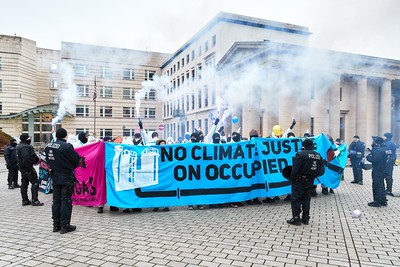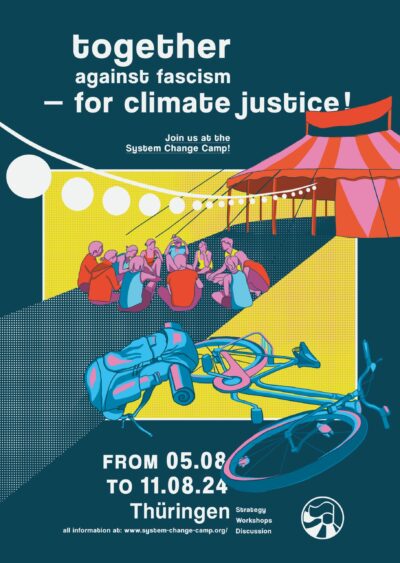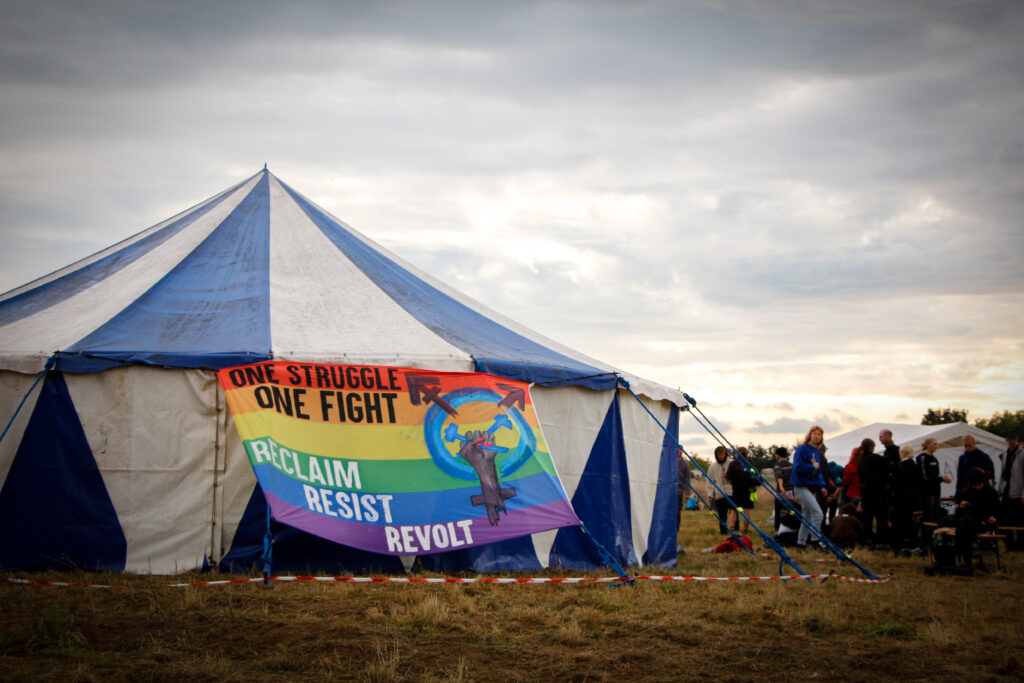NEWSLETTER CLIMATE ANTIREPRESSION # 24 – March 2024
Hello,
There is a lot of news: After the Lüterzath eviction, the first trial dates are now trickling in, the prison sentence against a BlockNeurath activist has been overturned, but there are also a lot of other trials, of which we can probably only discuss a fraction.
This time, for the further training, we have dealt with the accusation of coercion, which we are particularly concerned with in the prosecution of all kinds of blockades. And of course: AntiRRR has been around for over 10 years now. But read for yourself.

Contents:
RHEINLAND
Lützerath: Repression since the eviction
Trials for excavator occupation “Counterattack for the good life”
Neurath block: No jail for coal power plant blockade
Further trial dates
ON OUR OWN BEHALF
10th birthday
Information collection on the homepage restructured
NORTH
Trial about highway rappelling in Achim
Station forest occupation in Flensburg: emergency or not?
EAST
Proceedings after Heibo forest occupation
Berlin: Justice Now actions (Oct. 2021)
CENTER
Suspended sentence for street blockade
FOCUS ON COERCION
Text of the law
What does this have to do with us?
Violence
Reprehensibility
Aggravation
Highway rappelling
News from
RHEINLAND
Lützerath: Repression since the eviction
Since the eviction a year ago, there have been several waves of repression over Lützerath. Some people are accused of rioting during the large demonstration, another larger group is accused of moving towards Lützi against the will of the cops. The alleged offenses are mainly resistance, assault and breach of the peace. Occasionally there are also summonses for “incitement to commit crimes”.
The vast majority of accusations relate to scuffles with Team Blue, only very few to actual evictions from houses or RWE property claims. There have only been a few court dates so far, but there are still pending trials for things that happened before the eviction. Stay tuned!
If you are affected yourself, please contact the anti-repression group Rheinisches Revier (antirrr@riseup.net, pgp-key) for advice, support, exchange or simply for information so that we can keep an overview. There are regular online networking meetings for those affected!
Trials over excavator occupation “Counterattack for the good life”
The first lawsuits relating to the eviction of Lützerath last winter are getting underway. Initially because of an action that took place in solidarity with the eviction at the Hambach open-cast mine. Several activists have been charged with trespassing. They are accused of occupying a lignite excavator for several hours on January 16, 2023. Don’t leave them alone and come to the trials in Kerpen on 25.3.24 at 9:15, on 11.4.24 at 9:30 and on 19.4.24 at 9:30! Because solidarity is our weapon and being on trial is only half as bad if you are not alone!
Neurath block: No jail time for coal power plant blockade
While the district court in Grevenbroich continues to diligently impose a 9-month prison sentence for the coal-fired power plant blockade in Neurath (now in progress for the third person), the regional court in Mönchengladbach has decided that it shouldn’t be that much after all. It reduced the penalty to 120 daily rates for disrupting public operations, 30 euros each, i.e. a fine of 3600 euros. Still far too much, but better than jail. You are also welcome to read the assessment of those affected about the proceedings, their significance for the climate justice movement and what they have personally gained from conducting the proceedings openly and politically: https://antirrr.nirgendwo.info/2024/01/30/keine-haft-fuer-kohlekraftwerksblockade-und-ein-paar-gedanken-dazu/
Please come to the other trial dates on March 4, March 19 and March 25 at 11 a.m. at Grevenbroich District Court (vigil from 10:30 a.m.), published on https://antirrr.nirgendwo.info/block-neurath
Further trial dates
There are also other trial dates around Lützerath: On 6 March, the Erkelenz District Court will once again hear the case of the construction of the embankment, where there was resistance to the construction of an earth wall by RWE in the summer of 2022. And on 10.6.23 at 1 pm there will be a trial for trespassing, also before the Erkelenz AG.
If more dates are added or canceled, you will hopefully find them here.
If you want to take a look at trials, you can also go to the countless trials of the last generation.
NORTH
Trial about highway rappelling in Achim
There are more trial dates: On Thu, 21.3.24 at 9 am and 11 am, the local court in Achim (near Bremen) will hear about two highway abseiling actions that took place in 2021 around the conference of transport ministers in Bremen. At the same time, people were hanging banners over all the freeways leading to Bremen, some of them covering the gantries with new content. Now five of them are on trial at Achim District Court: they are charged with a particularly serious case of coercion (read our focus today). Come along or become active yourself against highways and the car industry.
More information soon at: https://autofrei.noblogs.org/
Station forest occupation in Flensburg: emergency or not?
In Flensburg, a judge acquitted a tree occupier on the grounds that occupying trees to protect the climate was covered by a justifiable state of emergency. This attracted nationwide attention. As expected, the Higher Regional Court has since overturned the ruling, although it is not so bad in some respects: it recognizes that climate change is a legal right that is justifiable in an emergency and that tree occupations are generally a suitable means. However, it believes that the existing legal process must be used. In another subsequent lawsuit, it was pointed out that this legal process did not exist at all because the city deliberately withheld the documents for the building permit until after the eviction and clearing so that no lawsuit could be filed. In two further trials, people have now been sentenced to 15 daily rates each for trespassing and appeals have been lodged.
Meanwhile, the Higher Administrative Court has ordered a halt to the construction of the parking garage and hotel construction project (following the lawsuit that was subsequently filed): The entire project is likely to be illegal. In the city itself, those involved in all projects for which trees are to be felled are now afraid of renewed occupations and choose alternatives from time to time: a few successes for the forest occupation.
The verdict from Schleswig Higher Regional Court: https://www.gesetze-rechtsprechung.sh.juris.de/bssh/document/JURE230054725
Reports on the station forest and the processes surrounding it: https://subtilus.info/bahnhofswald/
EAST
Proceedings after Heibo forest occupation
The occupation in Heibo was cleared in early 2023, shortly after the eviction of Lützerath. The occupation near Dresden was directed against the destruction of moorland for gravel extraction. Unfortunately, there are also proceedings afterwards. In December, one person was sentenced to six
months’ probation for resistance. At the moment, large fines for administrative offenses are rolling in and people are being asked to pay around 1000 euros each. If you receive something like this, first object to it and then talk to other people affected.
More detailed information will hopefully be available here soon:
https://heibo.noblogs.org/
https://heibo.noblogs.org/2023-12-20/urteilsverkuendung-im-widerstandsprozess/
Berlin: Justice Now actions (Oct. 2021)
Recently, proceedings for the Justice Now actions (Oct. 2021) have been opened. We ask all people who still have ongoing or new procedures for the action or need financial support for procedures to contact CAT (e-mail: cat@nirgendwo.info). The structures would like to complete the organizational tasks around these actions in 2021. We would therefore be very pleased to receive your feedback as to whether all procedures have already been completed.
MIDDLE
Suspended sentence for road blockade
In Frankfurt, a spokesperson for the Last Generation was also sentenced to a 2-month suspended prison sentence by the regional court for a street blockade – without having a previous conviction. The court cited the fact that blockades had been announced immediately. The verdicts on the street blockades of the last generation show very clearly how repression is increasing due to the social shift to the right and how the coercion paragraph (see below) is being extended to street blockades, which in the previous few years were more likely to be prosecuted as misdemeanors.
ON OUR OWN BEHALF
10th birthday
Unfortunately, we didn’t receive any texts from you, so our birthday newsletter has been canceled. But we are happy to have been able to accompany you for many years through all the stress with RWE, the police and the courts. Together we were able to prevent large-scale prosecution after a number of mass actions and have dealt with cease-and-desist letters (which RWE now rarely sends out). We were often able to help by finding lawyers, organizing trial trainings and a lot of mail consultations or financial support, even if we were not able to accompany every trial as we would have liked to. Thanks also to everyone who helped, whether by raising money, attending trials in solidarity or organizing meetings with victims.
Information collection on the homepage restructured
In all the past newsletters we have prepared a lot of content for you. The Rhineland EA has also written a lot of texts as part of the preparations for the Lützerath evacuation. We’ve tried to organize it for you and put it together thematically, both our texts and links to brochures from other groups where we found it useful. So take a look and see if your questions are answered here.
And if you would like us to research a particular newsletter focus, please get in touch.
FOCUS ON COERCION
For this newsletter, we have decided to explain another criminal offense in more detail so that we can at least understand a little of what we are being accused of. This time, we’ll take one of the standard accusations for blockades, namely coercion, Section 240 of the German Criminal Code. Many courts have already said something about this, which is often not particularly logical in itself and makes it relatively complicated overall. But we will try to summarize the current status of the accusation in a rough and understandable way.
Legal text
The law states: “Anyone who unlawfully compels a person to act, tolerate or refrain from acting by force or by threatening them with a serious evil is liable to a custodial sentence not exceeding three years or a monetary penalty.” This is followed by the fact that the act is only punishable if it is reprehensible, that the attempt is punishable and that there are particularly serious cases. To understand laws like this, let’s take a look at them one by one.
What does this have to do with us?
In concrete terms, we encounter the accusation when people are accused of anchoring, sticking, abseiling or sitting blockades, in short, anything that blocks in any way. We then recognize a part of this, namely that people cannot necessarily get to where they want to go, so they are forced to do something differently than they wanted to. As a rule, blockades actually serve to prevent something. However, this is only punishable as coercion if it affects specific people, i.e. specific drivers or train drivers. The fact that a route is blocked in general is not actually sufficient (some courts do, but that is the arbitrariness of the courts).
Violence
And what do such blockades have to do with violence or threats is the obvious next question. At first glance, these are usually relatively non-violent actions. But have you ever tried to define what violence is? Try it and you’ll quickly realize how difficult it actually is. And the courts have created their own definition, probably driven by what they wanted to see punished. And according to current case law, i.e. what higher courts such as the Federal Constitutional Court have said, it is violence in the sense of coercion if physical obstacles are erected that are not merely psychological. Seat blockers are a psychological obstacle for the courts, because cars and trucks could drive over them, in theory. So many courts have so far ruled that mere sit-in blockades are not coercion. (For showing off with expertise: This is in the 1st sit-in blockade decision of the Federal Constitutional Court). There is also the second decision of the Federal Constitutional Court on sit-in blockades, where they row back again: If a row of cars is stopped by a sit-in blockade and there is a second row behind it, then the first row, which is a physical obstacle, does exert force on those behind it, according to the court. Most courts see anchoring or sticking actions as a physical obstacle due to the connection with the rail or road and condemn such blockades as punishable coercion. In formulations such as that the connection to the rail by passing a pipe through it creates an exercise of force, it is also clear to see that this is not about logic, but about punishing inappropriate behavior.
Reprehensibility
One of the starting points in trials for coercion is reprehensibility. Coercion is only unlawful “if the use of force or the threat of violence for the intended purpose is to be regarded as reprehensible.” – that’s what the law says. Now, of course, we always believe that blocking roads, power plants or other shit is not reprehensible – after all, our goals are right and the climate crisis has to be stopped somehow. But because the state would rather persecute us after all, the judiciary says that so-called long-term goals (i.e. anything aimed at political change in the future) are not to be taken into account when examining whether the act was reprehensible. In practice, however, this also means that a balance must always be struck between freedom of assembly and the restrictions imposed by a blockade, for example. It is then a question of the duration, whether the people who are restricted are uninvolved or are part of the criticized object of an assembly, whether there were detour, etc.
This then provides many opportunities to defend oneself and also to address political objectives in the conduct of the proceedings, but also plenty of room for the arbitrariness of judges.
Tightening up
In recent years in particular, it has been observed how the coercion paragraph is being applied to more and more things and, for example, sit-in blockades or blockades with a small amount of material, such as taping, are being prosecuted as coercion and ever higher penalties are being imposed (up to prison sentences with and without probation). Highway rappelling One particular form of action is a good example of how creative the courts can get when it comes to sentencing. It’s about people who abseil down from (sign) bridges with a banner above a highway.
They always remain outside the height of the road and are therefore not actually in the way. In order to condemn this nevertheless, courts claim that the people used the police as an unwilling tool (yes, really!) to block the highway. In doing so, they used the police as a means of coercion and exerted violence on the motorists through the police. This is actually stated in some of the judgments that sentenced activists to fines or even suspended prison sentences. However, there were also some acquittals by judges who did not want to follow this. Although the topic is already being discussed in law courses, there are still few decisions from higher courts, so developments remain exciting – and there is still uncertainty for those affected.
However, this specific accusation also shows how arbitrary case law can be and that it has a major influence on what society wants to punish and what it doesn’t – and that the judicial authorities are often only the executors of this.If you want to find out more about the practice of accusations of coercion for the prosecution of politically undesirable actions, you can also find a good video on the subject here.
If you have contributions for the newsletter, please send them to us!
If you have any requests for key topics, get in touch and we might do some research for you!
Until then: take care, don’t get caught and above all don’t be intimidated!
Kind regards,
AntiRRR




